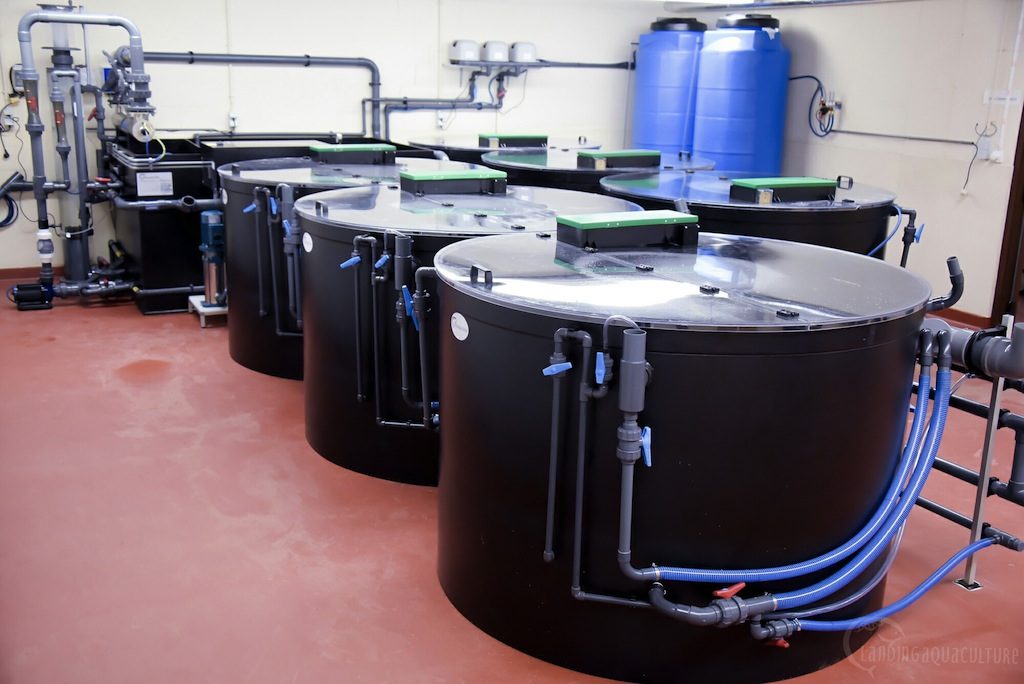
Features
Dutch company completes RAS unit for shrimp research
The provision of recirculation equipment, design and advice for hatchery developments in relation to shrimp farming research, commercial tilapia production and eel breeding innovations are already on the project CV of LandIng Aquaculture, a specialist recirculating aquaculture systems (RAS) enterprise which recently completed its first 18 months in business.
April 18, 2016 By Colin Ley
 No room for secrecy in recirc says engineer
No room for secrecy in recirc says engineerLocated in the Netherlands and headed by aquaculture engineer, Rob van de Ven, and Environmental Engineer, Carlos Espinal, the company recently finished the design and installation of a recirculation nursery in Belgium for the shrimp contract research organisation, IMAQUA. LandIng has also designed and supplied a tilapia hatchery for a client in Ghana, geared to producing two million swim-up fry a week, and has a prototype eel incubator under test in cooperation with Glasaal Volendam, a Netherlands-based eel research company.
“In each case we’ve sought to deliver our design and equipment solutions in as open and
accessible a manner as possible, providing training where necessary and staying clear of any unnecessary secrecy concerning what we’re doing and why we’re doing it,” van de Ven told Hatchery International.
“Often, when a new farm is created, the structure tends to be designed and built by specialists and then handed over to the farmer to get on with the job of making the new site work. That sometimes results in the people who are actually running the commercial end of the operation, taking over without sufficient knowledge to be successful.
“The net result, particularly in relation to the commissioning of RAS facilities, is that up to 50% of units end up having to be re-designed or rebuilt for one reason or another, according to a published study made by Badiola and collaborators in 2012,” said Espinal.
To avoid such problems in relation to the company’s tilapia hatchery design in Ghana, the Landlng team took the client concerned through “every step” of the planning, construction and commissioning process.
“We sought to explain how the system was designed to work, always keeping in mind what needed to be done in terms of production and work-flow organisation to enable the design to fulfil its potential,” he said.
Creating the latest hatchery unit for IMAQUA, a spin-off Ghent University company, developed to provide contract research services to the shrimp aquaculture industry, was also approached with careful planning and preparation between the two parties.
“We first started talking to IMAQUA just under a year ago, discussing what they wanted to achieve and assessing how to deliver according to their design brief,” said Mr van de Ven. “Being a research unit, they had very specific requirements, all of which had a direct impact on our final modular RAS solution.”
IMAQUA’s work, for example, is centred on shrimp disease and immunology research, a focus which required a design which was compact, expandable and portable.
LandIng’s solution was its PILOT system, in which components can be isolated, cleaned and removed while tanks can be drained, removed and added again without interruptions or the need for extra equipment.
The system also enables additional connections to be made to increase filtration capacity, allowing extra tanks to be connected without hassle.
Filtration demands for the IMAQUA system are extremely high, far greater than would be needed in a commercial setting, he said.
While in commercial on-growing circumstances, for example, shrimp farming units accept the rapid excretion and re-feeding habits of the species, the research being carried out by IMAQUA requires higher than normal filtration levels to minimise the build-up of bacterial issues.
The design also accommodates the unit’s additional water use demands, as IMAQUA’s João Dantas Lima explained: “Being based in Ghent, we use artificial seawater in our system, which inevitably adds to the cost of the process. Good filtration is therefore crucial in minimising our seawater replacement costs.
IMAQUA will shortly be stocking the newly completed system with SPF vannamei post-larvae which will be grown to adult size. In addition, in the near future, extra tanks are planned to be part of the system’s expansion to allow for feeding trials and extra flexibility.
—Colin Ley
Print this page